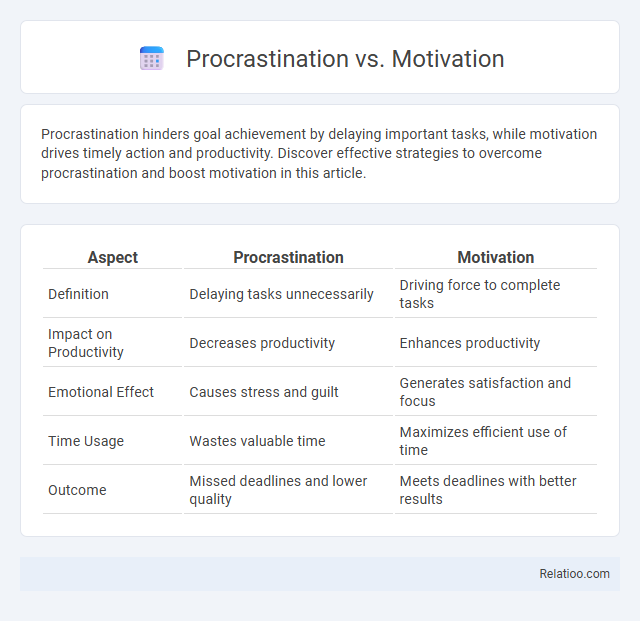Procrastination hinders goal achievement by delaying important tasks, while motivation drives timely action and productivity. Discover effective strategies to overcome procrastination and boost motivation in this article.
Table of Comparison
| Aspect | Procrastination | Motivation |
|---|---|---|
| Definition | Delaying tasks unnecessarily | Driving force to complete tasks |
| Impact on Productivity | Decreases productivity | Enhances productivity |
| Emotional Effect | Causes stress and guilt | Generates satisfaction and focus |
| Time Usage | Wastes valuable time | Maximizes efficient use of time |
| Outcome | Missed deadlines and lower quality | Meets deadlines with better results |
Understanding Procrastination: Causes and Consequences
Procrastination stems from fear of failure, perfectionism, and low self-confidence, often leading to increased stress and reduced productivity. Motivation acts as a critical counterforce, driving goal-oriented behavior and helping overcome hesitation. Understanding these causes is essential for developing strategies that enhance focus, time management, and emotional regulation.
The Psychology Behind Motivation
Understanding the psychology behind motivation reveals how intrinsic and extrinsic factors drive Your behavior and goal pursuit. Motivation stems from neural processes involving dopamine release, which enhances focus and rewards anticipation, while procrastination often results from emotional regulation failures and task aversion. Balancing these psychological dynamics can reduce procrastination and strengthen consistent motivation for improved productivity.
Procrastination vs Motivation: Key Differences
Procrastination involves delaying tasks despite potential negative consequences, while motivation drives individuals to initiate and complete actions promptly. Key differences lie in underlying emotional triggers--procrastination often stems from fear or anxiety, whereas motivation arises from goal-oriented focus and positive reinforcement. Understanding these dynamics helps optimize productivity by cultivating motivation to counteract procrastination tendencies.
Common Triggers of Procrastination
Common triggers of procrastination include fear of failure, perfectionism, and lack of clear goals, which hinder motivation by creating mental barriers and reducing task initiation. Low motivation often intensifies procrastination cycles, as insufficient drive makes it difficult to overcome distractions or perceived task difficulty. Addressing these triggers requires identifying underlying psychological factors and implementing strategies like goal-setting, time management, and self-reward to boost motivation and reduce delays.
Factors That Fuel Motivation
Intrinsic motivation, driven by personal passion and meaningful goals, significantly enhances productivity by reducing procrastination. External incentives such as rewards and social recognition also stimulate motivation, creating a positive feedback loop that counters delay tactics. Clear goal-setting, self-discipline, and a structured environment further strengthen motivation, minimizing the impact of procrastination on task completion.
The Science of Habits: Breaking the Cycle
The science of habits reveals that procrastination stems from entrenched neural pathways that favor immediate pleasure over long-term goals, while motivation activates the brain's reward system to encourage action. Breaking the cycle involves rewiring your brain through consistent, small behavioral changes that reinforce productive habits and weaken procrastinative triggers. Understanding this dynamic allows you to strategically replace avoidance patterns with motivation-driven routines, enhancing focus and efficiency.
Strategies to Transform Procrastination into Motivation
Transforming procrastination into motivation involves identifying underlying triggers, setting clear, achievable goals, and breaking tasks into manageable steps to reduce overwhelm. Utilizing techniques such as time-blocking, prioritizing tasks based on urgency and importance, and leveraging positive reinforcement boosts engagement and productivity. Incorporating accountability mechanisms, like regular check-ins and progress tracking, increases commitment and helps maintain momentum throughout the task completion process.
The Role of Mindset in Overcoming Procrastination
Mindset plays a crucial role in overcoming procrastination by shaping how individuals perceive and respond to tasks. A growth mindset encourages viewing challenges as opportunities for learning, which fosters motivation and reduces avoidance behaviors. By shifting from a fixed mindset that links procrastination to inherent inability, people can develop self-efficacy and implement effective time management strategies, ultimately enhancing productivity and goal completion.
Practical Techniques to Boost Daily Motivation
Procrastination often stems from a lack of clear goals and immediate rewards, while motivation drives consistent action toward achieving those goals; practical techniques such as breaking tasks into smaller steps, using time-blocking methods, and applying the Pomodoro Technique can effectively boost daily motivation and reduce delays. Setting specific, measurable objectives and rewarding progress with positive reinforcement strengthens intrinsic motivation, combating the cycle of procrastination. Leveraging tools like habit trackers and mindfulness exercises enhances focus and accountability, fostering a productive routine that sustains motivation throughout the day.
Long-Term Success: Maintaining Motivation and Reducing Procrastination
Sustaining long-term success relies heavily on balancing motivation and procrastination by implementing consistent goal-setting strategies and fostering intrinsic motivation through personal values alignment. Techniques such as breaking tasks into manageable steps and utilizing time management tools significantly reduce procrastination tendencies and enhance productivity. Regular self-assessment and adaptive mindset shifts contribute to maintaining motivation while minimizing delays in task completion.

Infographic: Procrastination vs Motivation
 relatioo.com
relatioo.com